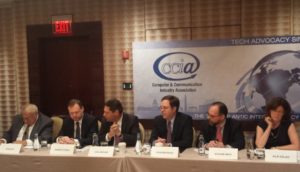Washington — Senior U.S. and EU government officials and tech representatives took stock of the transatlantic digital relationship at CCIA’s Transatlantic Internet Policy Dialogue today.
 Today’s event provides stakeholders’ input to the U.S. and EU’s own “Information Society Dialogue” tomorrow, Tuesday. The EU and U.S. will discuss regulation of transatlantic data transfers, Privacy Shield, telecoms reform, copyright, audio-visual, Internet governance and online freedoms.
Today’s event provides stakeholders’ input to the U.S. and EU’s own “Information Society Dialogue” tomorrow, Tuesday. The EU and U.S. will discuss regulation of transatlantic data transfers, Privacy Shield, telecoms reform, copyright, audio-visual, Internet governance and online freedoms.
Speakers included:
- Roberto Viola, Director General, Communications Networks, Content and Technology, European Commission
- Alan Davidson, Director of Digital Economy, U.S. Department of Commerce
- Joel Kaplan, Vice President for Global Public Policy, Facebook
- Julie Zoller, Senior Deputy Coordinator International Communication and Information Policy, U.S. Department of State
- Richard Nohe, General Counsel for BT Americas
 At the event, the Computer & Communications Industry Association (CCIA) released its ten recommendations for a thriving transatlantic digital market. In his opening remarks, Director-General Viola said he read CCIA’s recommendations and agrees.
At the event, the Computer & Communications Industry Association (CCIA) released its ten recommendations for a thriving transatlantic digital market. In his opening remarks, Director-General Viola said he read CCIA’s recommendations and agrees.
Later Viola noted that despite current challenges, the EU and U.S. “have a special relationship. Both recognize the internet is one of the greatest gifts to humanity in the last century. We on both sides of the Atlantic stand ready to defend it,” Viola said, noting that is the reason for talks between the EU and U.S. today and tomorrow on issues like the free data flows and free speech.
CCIA President & CEO Ed Black moderated the panel discussion. The following can be attributed to him:
“The EU and U.S. face similar challenges on how to achieve a thriving digital economy and the tech industry and other stakeholders should be part of that conversation.”
“Our transatlantic economy is the world’s biggest, so if we get our policy framework right and overcome our minor differences, we can model best practices for promoting an open Internet, competitive markets and growing innovation economy.”